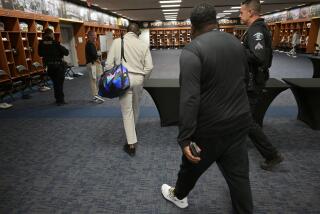Dykstra’s Father to Pursue Probe
- Share via
The father of Rollie Dykstra, saying, “I want to get to the truth,” announced Thursday that he plans to hire an investigator to find out what University of La Verne athletic officials knew about the headaches his son experienced before his serious head injury in Saturday’s game.
Roland Dykstra Sr., the La Verne quarterback’s father, said his decision to pursue outside involvement came after he learned “someone at La Verne is saying Rollie discouraged medical treatment.”
“You know what’s happening?” Dykstra Sr. said. “They’re putting up a wall.”
Rollie Dykstra, 24, collapsed on La Verne’s sideline Saturday and endured violent convulsions minutes after being tackled by a University of Redlands defender. Dykstra has remained in critical condition -- comatose and in intensive care -- since.
La Verne trainer Jim May and university spokeswoman Deborah Mandabach have refused to comment about Dykstra’s situation. La Verne football Coach Don Morel said earlier this week he was aware Dykstra reported a “minor” headache to a trainer Oct. 7, two days after the Leopards’ 30-6 loss to Cal Lutheran.
Jennifer Ross, Rollie Dykstra’s girlfriend, said Dykstra told her he made repeated complaints about his headaches to May, but never received medical attention before Saturday.
“I was asking him every day, ‘Babe, did you go get your head checked?’ He told me they’d take him to get it checked,” Ross said. “In the week before the game, he told me, ‘They said I’m fine.’ ”
Most bothersome, said Ross, was a conversation with Dykstra in which he said the delay in treatment was “some issue with medical expenses, that it would cost the school such and such.”
Ross said she responded, “That’s just not right, Roll.’ ”
Ross, who has dated Dykstra for two years and lived with him near the La Verne campus, said he first experienced painful headaches after being sacked eight times in the Leopards’ Sept. 28 loss to Claremont-Mudd-Scripps. Following the Cal Lutheran loss, Ross said Dykstra told her, “My head’s throbbing.”
“It was daily after that, and it wasn’t just a slight headache,” Ross said. “If he jostled his head at all, or turned his head, it hurt him bad. Something wasn’t right.”
Ross said Dykstra was frustrated that the pain was lingering, and that she was irritated by the delay in treatment. Ross said La Verne previously paid for Dykstra to visit an area medical center after he injured an ankle.
Dykstra did not have personal medical coverage, Ross said. An athletic director at an NCAA Division III university in Southern California said schools such as La Verne provide medical coverage for athletes for injuries suffered in training or competition, with supplemental “catastrophic” coverage provided by the NCAA. The athletic director said the price of medical insurance policies has skyrocketed since the terrorist attacks of Sept. 11,; that his school’s costs have doubled.
“You want to limit claims, but the way you do that is by ensuring your kids are fit going into the season, and by removing them from as many unsafe situations as possible,” the athletic director said. “There must be wide-open communication between the athlete, the player, the coach and the doctor. In this case, you wonder, was the injury articulated well enough to the trainer? Was he raised in a culture where you don’t complain, where you should be tough? Football kids are the toughest to deal with, and maybe something was broken in the translation.”
Doctors at Pomona Valley Hospital Medical Center have not confirmed Rollie Dykstra suffered Second Impact Syndrome, which is believed to have caused the death of Costa Mesa High linebacker Matt Colby last year. Like Dykstra, Colby complained of headaches after two previous games before suffering his fatal injury.
Roland Dykstra would not reveal if the investigator he intended to hire would be a lawyer.
Stephen Solomon, a Playa del Rey attorney whose firm won $4 million from the Manhattan Beach Unified School District and a physician for allowing a Mira Costa High football player to participate in a 1995 game two days after he suffered bleeding near the brain, said, “This would merit seriously looking into, to see if the educational facility took appropriate steps to protect the well-being of the football player.”



